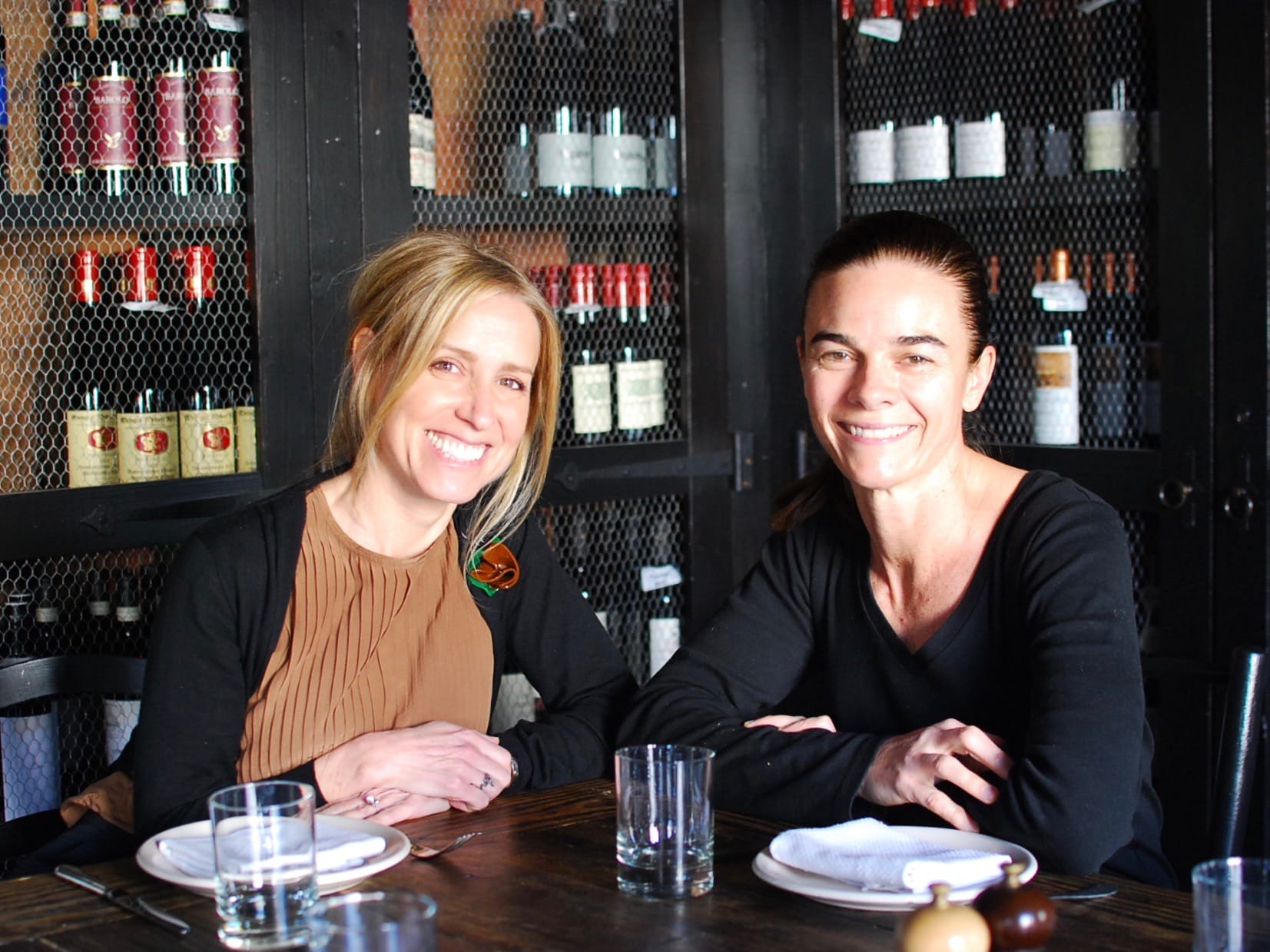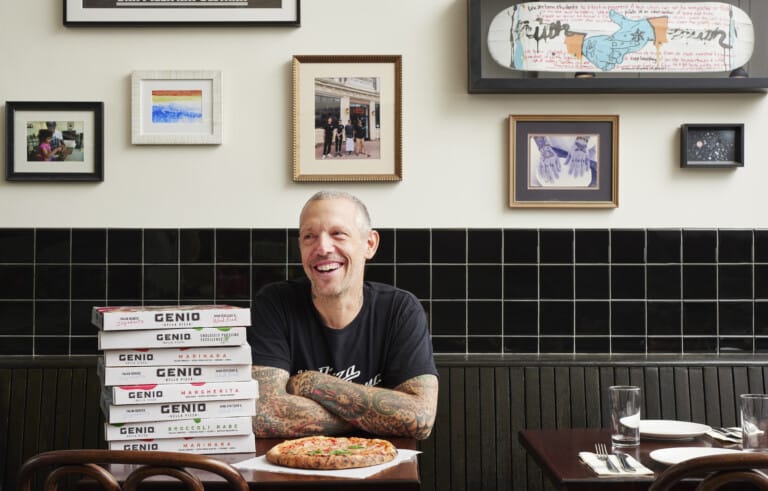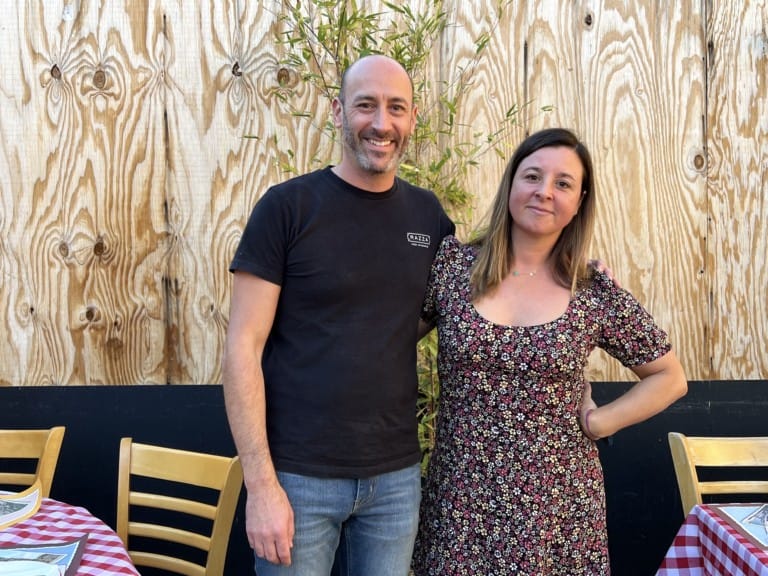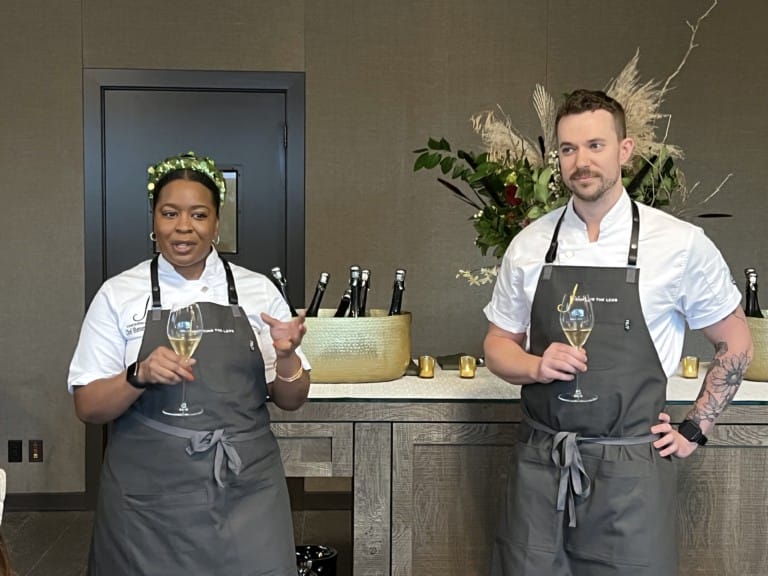INTERVIEW CONTINUED FROM PREVIOUS PAGE
Was it a given that both of you would work in restaurants for a living, or did you consider other careers?
Styne: I was an art history major in college and I thought I was going to direct art galleries. I thought I would work in museums and own a gallery eventually.
Goin: Going back to – “What am I going to do with my life?” – being a chef was not really anything anybody thought about. It wasn’t like now with the Food Network. I studied history and thought maybe I was going to be a diplomat – my dad wanted me to be a professor – once I got to college, I immediately got a job in a restaurant. It was the thing I loved to do. I loved school too, but that was my secret passion, and when I graduated, am I going to do what I’m supposed to do, or am I going to do the naughty, fun thing that I want to do? I figured I could do the naughty, fun thing I want to do, and then I was thinking in my head, “I don’t want to be 30 and decide I want to be a chef.” 30, aka 70. Once I started, I was hooked. That’s the type of person I’m looking for in the kitchen, it’s not an issue if it’s late, or it’s hard, or it’s unbelievably busy. It’s a very repetitive job too. Some people are like, “I’ve been working pantry for two months, can I change stations?” No, you can’t.
You’re working on an A.O.C. Cookbook now?
Goin: I am. Most of the work is done. It’s in the hands of the publisher and comes out in [the fall].
How do you decide, when you narrow down the recipes for a certain restaurant, or like Sunday Suppers at Lucques, what’s that process like?
Goin: That’s a really good question. It’s a little like writing a menu, but almost harder, because you’re doing the whole year at once. For A.O.C., part of it is easy because there are a lot of things that have been on the menu from the beginning, the A.O.C. classics. Those are obviously going to be in there. Then the menu is seasonal. Kind of the way the book is, there’s Fish, but then Spring Fish, Summer Fish…so basically I went through a lot of old menus and notes and talked to a lot of the staff about what their favorite dishes were, made a list. Then I’d go through and pick, because there could only be a certain number of dishes that have bacon on them. You can’t have nuts on everything, and not all of the dishes can be really heavy. Through process of elimination, I’d say to Caroline, “It’s either going to be the pork cheeks or the veal cheeks. Which one should I put?” I’m writing the book in the way that you write a menu, in that it has to balanced. I’d get it done and then I’d be like, “Oh my gosh, I don’t have an asparagus recipe. That’s really strange.”
So you had a certain number of pages to work with?
The first thing I had to do was make the format. That was a really tricky part for here. I realized people were probably not going to cook small plates for home, so I decided to make the recipes the same size as the Lucques cookbook recipes. Everything’s for 6, so a salad recipe’s like 6 regular sized salads. It was tricky to figure out how to make the book reflect A.O.C. I decided to make it like the way the menu is, but then put the seasonality in there too. The categories are in there, divided up by the seasons.
In terms of beverage, how do you try to distinguish the different programs, and how much fun is it for you to a full liquor license, as opposed to just beer and wine?
Styne: Since the other restaurant was beer and wine, I was really into focusing on a lot of wines open and available for people to taste. We had 50 wines by the glass there, 50 dry wines. We still had lots of sparkling and dessert wines on top of that. In the move over here, because we’re going to have this full bar, and we have this fantastic mixologist who works with us, who put together all the drink recipes for us and who is leading the bar team, teaming them, I decided it would be silly to have so many wines open and available, financially wasteful. And I could see it not getting quite the focus because the drinks were fantastic too. So I basically cut the size of the list in half, so I could make it a tiny bit more focused. There’s something nice about it not being as broad, and having it a little bit more curated. So we have 24 glasses with a wide stem glass, so I cut that in half too. I decided since what Suzanne does in the kitchen, with everything being organic, sustainable, local, I thought I would kind of focus the wine list in that way too. It could actually mirror the entire philosophy of the restaurant and not just be its own little thing.
15 years ago, when we opened Lucques, it was hard to find as many wines with people focusing on that. And I wasn’t quite as aware of everything that entailed, way back when. We had a one-page list at Lucques when we first opened with 30-40 selections on it. That was a whole challenge in itself. It was kind of a challenge in making the list smaller than what we have in other restaurants. I think I’m really good at doing a 300-400 bottle list, but doing a 150 bottle list is really hard. It’s really hard to go through each reason and say, “Okay, I can only have one wine from this region. What is it going to be?” I decided to focus the list on wines that are organic, sustainable or biodynamically farmed. That gave me really nice boundaries to work within, and it made it really fun. Aside from it being a fantastically delicious wine, but focusing on the other elements in it too. It’s been really fun to teach our staff about it. Everyone’s been very enthusiastic.
One charitable question. What are you hoping to accomplish with Alex’s Lemonade Stand this year?
Styne: More money.
Goin: More money. I almost think that every time we beat our previous year, each year, how are we going to beat it again?
So how are you?
Styne: We’re trying to attract some great auction items. Keep the quality of the chefs up.
Goin: But it’s been sold out almost every year.
Styne: The first part is to deliver a great event every year and make everyone want to come back and get more involved. Especially with this charity, they come for the event and leave really inspired by the charity. And they leave saying, “How can I do more to help out?”
Goin: Maybe that’s the goal. We love the venue and want to stay where it is. We can’t really sell too many more tickets, we’re already sold out. We want to do that again. We don’t want to raise the ticket price, so where else are we going? I guess it’s getting people to donate or sponsor. The auction’s tricky, because it’s a combination of what items you have the luck of who happens to be there, what mood they’re in, if they hear you…It’s kind of crazy, but I think that’s a really good goal, have it spin off and have people do more events because of it.
There are several culinary events happening every week at this point through November. How do you decide which ones to participate in?
Goin: I kind of go on ones we’ve done before, or have committed to in the past, and are depending on us, and try not to add anything else, because it’s a lot. It takes you away from the restaurant. The ones that are out of town take you away from family. It can be really draining. We do a lot of auction items for Alex’s Lemonade too. I went to Joe Bastianich’s house and made dinner there. It’s all fun and really great when you’re doing it, but sometimes it’s like, “Oh my god, I’m going to get on a plane right now and go to New York for two days?” It can be a little trying, but fun, and all for a good cause.
Styne: One great thing about Alex’s Lemonade now is this is something that we focus on. It’s hard because there are so many great causes and you want to help everything, but it’s great to have some place to focus your energy, instead of being in a million places.
Here are a few fun questions. What’s the last dish that you cooked for Suzanne?
Styne: It was 15 years ago, and I think it was over-steamed vegetables and rice.
Goin: Bagels. She makes me a lot of bagels.
What’s the last bottle of wine that you bought for Caroline?
Goin: What’s that saying? Don’t bring the mountain to Mohammed. We taste a lot of wine together. I don’t think I’ve bought you a bottle.
Styne: You’ve never bought me a bottle of wine. I usually bring the wine to her.
What was the last concert that you saw?
Goin: My Morning Jacket at the Wiltern.
How was it?
Goin: It was really good, and I was so tired, and I don’t know if you know them, but they play forever. The first half, it was good, but then it actually started getting really intense and really great and into the fourth hour, I was like, “Okay, this is pretty awesome.” At hour two-and-a-half, I wanted to go home.
Styne: Oh my god, I can’t think what the last concert I went to was. U2, but that was so long ago…A Bryan Ferry concert. That was at the Wiltern…That was so long ago.
Goin: You’re reminding us that we need to go.
What was the last movie you saw in a theatre?
Goin: “Rise of The Guardians,” a kids’ Christmas movie. I’ve seen a bunch with the kids. I’ve seen that. I’ve seen “Brave.” I did see “Argo,” but that was a screener.
Styne: I saw “Argo” on a screener. In a theatre, it was with my daughter. We were at the ArcLight. It was “Rock of Ages,” and we walked out, but there was another one since then.
What about one must watch TV that’s not food related?
Goin: We have a bunch of those.
Styne: “Homeland.” Intense. Insanely amazing. I love that type of spy thriller stuff. “Workaholics,” the most stupidly funny show. Horribly stupid, embarrassing that I watch it, but it’s genius at the same time.
Goin: We’ve been watching “The Following.” It’s good, but every time we watch it, we go, “Jesus, it’s so violent.”…The last time I got home, [husband] David [Lentz] was watching “Southland.”…We watch “Top Chef” too, for the drama.









Leave a Comment